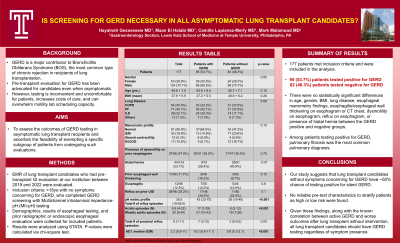Tuesday Poster Session
Category: Esophagus
P3270 - Is Screening for GERD Necessary in All Asymptomatic Lung Transplant Candidates?
Tuesday, October 24, 2023
10:30 AM - 4:00 PM PT
Location: Exhibit Hall

Has Audio

Camille Lupianez-Merly, MD
Temple University Hospital
Philadelphia, PA
Presenting Author(s)
Mark Malamood, MD1, Maan El Halabi, MD1, Hayalneh Gessessew, MD2, Camille Lupianez, MD1
1Temple University Hospital, Philadelphia, PA; 2Emory University Hospital, Philadelphia, PA
Introduction: Gastroesophageal reflux disease (GERD) is a common comorbidity & possible contributor to advanced pulmonary disease. GERD is also a major contributor to Bronchiolitis Obliterans Syndrome (BOS), the most common type of chronic rejection in recipients of lung transplantation. Due to this, evaluation for GERD has been advocated for lung transplant candidates even without symptoms of GERD. GERD testing is inconvenient & uncomfortable for patients, increases cost of care, and can overwhelm motility lab scheduling capacity. The aim of this study is to evaluate the outcomes of GERD testing in lung transplant patients without symptoms concerning for GERD and determine if a subset of patients can skip these tests.
Methods: A retrospective chart review was conducted on lung transplant candidates who had pre-transplant GI evaluation at our institution between 2019 and 2022. Adult patients ( >18) were included in the study if they reported no symptoms concerning for GERD (heartburn, regurgitation) and completed GERD screening with Multichannel intraluminal impedance-pH (MII-pH) testing. Demographics, results of esophageal testing, and prior radiographic or endoscopic esophageal evaluation were collected for included patients. Results were analyzed using STATA. P-values were calculated via chi-square test.
Results: 177 patients met inclusion criteria and were included in the analysis. 95 (53.7%) patients tested positive for GERD and 82 (46.3%) patients tested negative for GERD. There were no statistically significant differences in age, gender, BMI, lung disease, esophageal manometry findings, esophagitis/esophageal wall thickening on esophagram or CT chest, dysmotility on esophagram, reflux on esophagram, or presence of hiatal hernia between the GERD positive and negative groups. Among patients testing positive for GERD, pulmonary fibrosis was the most common pulmonary diagnosis.
Discussion: Our study suggests that lung transplant candidates without symptoms concerning for GERD have essentially a 50/50 chance of testing positive for silent GERD and that there are no reliable pre-test characteristics to stratify patients as high or low risk. Given these findings, along with the known correlation between active GERD and worse outcomes after lung transplant without intervention, all lung transplant candidates should have GERD testing regardless of symptom presence.
Disclosures:
Mark Malamood, MD1, Maan El Halabi, MD1, Hayalneh Gessessew, MD2, Camille Lupianez, MD1. P3270 - Is Screening for GERD Necessary in All Asymptomatic Lung Transplant Candidates?, ACG 2023 Annual Scientific Meeting Abstracts. Vancouver, BC, Canada: American College of Gastroenterology.
1Temple University Hospital, Philadelphia, PA; 2Emory University Hospital, Philadelphia, PA
Introduction: Gastroesophageal reflux disease (GERD) is a common comorbidity & possible contributor to advanced pulmonary disease. GERD is also a major contributor to Bronchiolitis Obliterans Syndrome (BOS), the most common type of chronic rejection in recipients of lung transplantation. Due to this, evaluation for GERD has been advocated for lung transplant candidates even without symptoms of GERD. GERD testing is inconvenient & uncomfortable for patients, increases cost of care, and can overwhelm motility lab scheduling capacity. The aim of this study is to evaluate the outcomes of GERD testing in lung transplant patients without symptoms concerning for GERD and determine if a subset of patients can skip these tests.
Methods: A retrospective chart review was conducted on lung transplant candidates who had pre-transplant GI evaluation at our institution between 2019 and 2022. Adult patients ( >18) were included in the study if they reported no symptoms concerning for GERD (heartburn, regurgitation) and completed GERD screening with Multichannel intraluminal impedance-pH (MII-pH) testing. Demographics, results of esophageal testing, and prior radiographic or endoscopic esophageal evaluation were collected for included patients. Results were analyzed using STATA. P-values were calculated via chi-square test.
Results: 177 patients met inclusion criteria and were included in the analysis. 95 (53.7%) patients tested positive for GERD and 82 (46.3%) patients tested negative for GERD. There were no statistically significant differences in age, gender, BMI, lung disease, esophageal manometry findings, esophagitis/esophageal wall thickening on esophagram or CT chest, dysmotility on esophagram, reflux on esophagram, or presence of hiatal hernia between the GERD positive and negative groups. Among patients testing positive for GERD, pulmonary fibrosis was the most common pulmonary diagnosis.
Discussion: Our study suggests that lung transplant candidates without symptoms concerning for GERD have essentially a 50/50 chance of testing positive for silent GERD and that there are no reliable pre-test characteristics to stratify patients as high or low risk. Given these findings, along with the known correlation between active GERD and worse outcomes after lung transplant without intervention, all lung transplant candidates should have GERD testing regardless of symptom presence.
Disclosures:
Mark Malamood indicated no relevant financial relationships.
Maan El Halabi indicated no relevant financial relationships.
Hayalneh Gessessew indicated no relevant financial relationships.
Camille Lupianez indicated no relevant financial relationships.
Mark Malamood, MD1, Maan El Halabi, MD1, Hayalneh Gessessew, MD2, Camille Lupianez, MD1. P3270 - Is Screening for GERD Necessary in All Asymptomatic Lung Transplant Candidates?, ACG 2023 Annual Scientific Meeting Abstracts. Vancouver, BC, Canada: American College of Gastroenterology.
